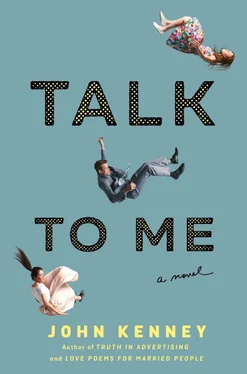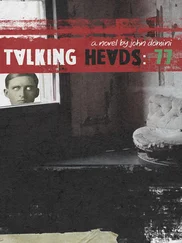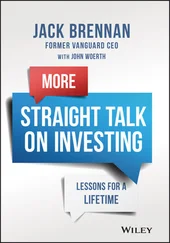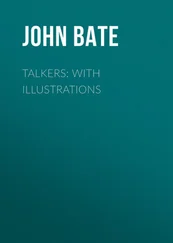But for just a moment, barely measurable, he was her father. And Franny was terrified for him. She pitied him. Yes, he was rich and white and powerful. He had homes and influence, access and reach. He had cars and stuff and a thin, fit wife who was empirically beautiful. He had a lovely daughter who was—well, used to be—seen with him, the family, out at an event, smiling, the savage screaming and fighting on hold for the photos. Yet she also felt for him. Because it was a veneer. And it was all about to be taken away in a public and deeply humiliating fashion.
Franny saw the future. They were going to crucify him. She needed to call her mother. She needed to call the office. She needed to get on the story.
• • •
If Claire had walked from Dodge’s king-sized bed with the impossibly soft Frette sheets and stood naked at the large windows with the extraordinary view out onto Central Park, all the way across to the Beaux Arts wonders of the West Side—the San Remo and the St. Urban—she might have spied her soon-to-be-ex-husband walking briskly around the Jacqueline Kennedy Onassis Reservoir, on his second of two laps. But she did not. She was busy lying nude, enjoying the postcoital bliss of new lust.
• • •
Ted felt no such bliss as he made the southern turn around the reservoir in Central Park. A low-grade tension wouldn’t leave him.
He was thinking about a story they were preparing on Congress, on the division between the parties. He’d seen some of the interview footage, the representatives and senators talking about the divide. One of them said, “Something fundamental has shifted. I believe the democracy itself is in peril.” They were using that line as part of the teaser campaign.
It seemed true to Ted. The way we interacted now, how we saw each other, as a member of a political party, a cultural group, an affiliation, a sexual identity, a devotee of a TV show. Instead of personality traits, quirks, hobbies, these labels had come to define us. Cable talk shows—comedy, news, the lines blurring—and their easy, crude, relentless, school-yard-bully trouncing of pretty much everything they disagreed with. Others didn’t merely have a different opinion. They were wrong. They were bad. There was anger and self-righteousness and why aren’t you listening to me because I am right. Sarcasm had replaced hope. Cruelty and judgment had replaced empathy.
And what of the great hope of social media? Of technology? That it would bring us together? Sure, there were remarkable blogs out there. People were, in some spaces, connecting and growing and creating. But the hope that we would find common ground with strangers, people with whom we disagreed, that we would find a common humanity, see the truth that we are all the same, deep down, had failed. The technology was new. The traits and insecurities, the biases and anger and hatred that we brought to it were not. Technology hadn’t failed. Humanity had.
This was not something we expressed, ever, to anyone. Because the assumption from people’s Instagram pages and Facebook pages and Twitter feeds was that they lived rewarding, happy lives.
Look at Glen’s goddamned vacation photos at the Grand Canyon! Look how annoyingly happy he and his beautiful family are! They’re fucking perfect!
But, of course, what’s not seen in Glen’s vacation photos and iPhone videos, what’s never seen, is the moment right after the photo, when Glen screamed at his teenage son, Jared, for hitting his younger sister, Missy, and making her cry, Glen overreacting and calling Jared a “little prick” and threatening to smash Jared’s face in, Glen’s wife, Mary Pat, reacting badly to this behavior from her dickhead husband, and also because she much preferred Jared to Missy, who had, in Mary Pat’s mind, always been a problem child, Mary Pat shouting at Glen and the rest of the afternoon at the South Rim of the Grand Canyon ruined, everyone in a mood, wishing only to get back to the crappy motel, pack, get on the plane home, lock the door to their respective rooms, dive into their screens, to their solitude, to their own world.
The nation was angry. And it had a new and wonderful tool to express its anger.
• • •
Without realizing it, Ted had stopped walking and was staring up at the sky. Joggers made their way around the cinder track in the fading light, their footfalls making an earthy sound, a country sound. Quieter in here, the earth cooling, wisps of cold air circling up, the trees exhaling. Ted could hear his own breathing.
Screw the third lap. Time to get home, a hot shower. He’d order in from Five Guys, a treat to himself. Watch Tinker Tailor Soldier Spy for the fifth time. He was feeling good. His phone buzzed. It was Lou. Something about a video on the internet.
• • •
The quality of mercy , the English poet wrote, is not strained; It droppeth as the gentle rain from heaven upon the place beneath.
Maybe back in 1620s Stratford-upon-Avon that was a thing. But this was New York City, America, the World Wide Web, in 2016, and, well, the quality of mercy was indeed strained. It was broken, actually. It was a punch line on Comedy Central and a relentless stream of scathing tweets and comment sections. The quality of mercy didn’t make for good ratings and, hey, someone had to pay, someone had to take the blame.
The quality of mercy no longer fell as a gentle rain. It slashed down like a toxic rain, like an acid rain, like a storm of shit upon the crown of whoever had the misfortune of making a mistake. Of having a bad day. Of being captured doing something selfish or rude or foolish. It didn’t matter who you were. If you were in power all the better. If you were famous, then the masses were giddy. People like Ted? Rich, powerful, a white man in a world grown tired of their reign? Mercy? We think not. How about merciless? How about unrelentingly cruel and savage? Yes. Yes, that would do nicely.
The emergency call involved Ted, Lou, several network lawyers, PR people, and Tamara Fine, the president of the network. The head of the twelfth floor, as they liked to say. Where the CEO sat. She’d been with the network less than a year. Prior to this she was head of Sky TV in London.
Most of the people on the phone felt that the situation was containable. The PR people—on a years-long retainer with the network that Tamara wanted to reevaluate—felt that initially the story would cause problems but it would ultimately blow over. Ted, they felt, was too much of an icon and had too much equity in the hearts and minds of TV-watching America.
Tamara listened as Ted explained what had transpired the evening of his meltdown, soaking in a bath in a $4 million home in Bronxville, a ritual before bed, holding her cell phone with one hand and a cold bottle of Sierra Nevada with the other. She was a good listener. She believed this was the secret to business. To life, really. She had taken an improv comedy class in college. Two people, standing on a stage, given a topic by the instructor. Go. The trick, she learned, was not to think of the answer while the other person was talking. The trick was to listen so carefully that the answer formed itself organically. Just listen, the instructor said. You’ll find the answer.
So many people wanted to speak, to talk, forming their sentences while others spoke. Tamara listened and waited. But now, on this call, she listened and was bored because she saw how this ended. Movie watching was hard for Tamara. TV shows, too. She saw the plot points, saw the end, well before it came. She’d taken a first in maths at Cambridge and was fluent in French, Spanish, and Japanese. She’d been a competitive swimmer and still swam two mornings a week at the Field Club pool.
Читать дальше












